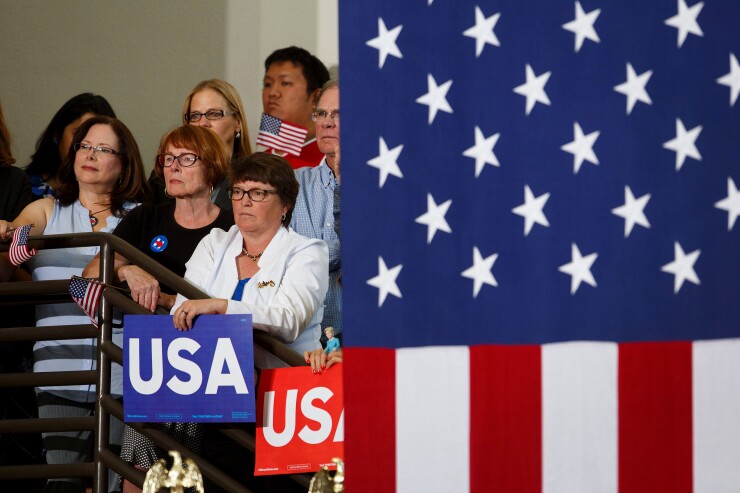Many advisers view political discussions with their clients as a kind of third rail, because the topic has the potential to create unnecessary tensions.
“Politics and planning are a terrible mix,” says Jonathan Swanburg, an adviser with the Tri-Star Group in Houston. “The best way to deal with politics is to not bring it up at all.”
That’s the conventional wisdom, but the 2016 election cycle has been anything but conventional. Planners are finding that anxious clients are bringing up the issue and need strategies to deal with those fears.
The conversations can be tricky, but avoiding them altogether isn’t a good idea either, many planners say.
Swanburg’s strategy is to redirect clients’ anxiety over politics into more useful discussions about their financial situations. Turn the fear into a teachable moment, he says.

“Ultimately you have to steer the conversation back away from politics,” he says. “You tell clients: ‘If you’re worried that your portfolio will go down too much, that just means we have the wrong allocation, then we have to change it.’ That’s the conversation we have.”
A TEACHABLE MOMENT
Swanburg tries to keep the discussion on client finances, not client political ideology.
“The only time you should ever fight is when they have a really bad idea on something that’s going to impact their financial plan,” he says. “So if a client comes to you and says, ‘Trump’s going to win, and I need to go into all cash or buy gold,’ you say calmly, ‘I hear what you’re saying, and I absolutely understand, but you need to go back and look at this from the big picture and take politics out of it.’”
“The economy shapes elections, not elections shaping the economy.” - Bryan Beatty
That can be difficult given the noise of this political season.
Eight out of 10 high-net-worth investors think that the outcome of the election will directly affect their financial well-being, while 75%, are nervous about the economy no matter who wins, a recent UBS Investor Watch survey found.
Anxiety is leading most investors to consider changing or reducing their holdings based on the outcome of the Nov. 8 election. Some have made changes already: 10% say they’ve made major adjustments because of the election; 5% have pulled out of U.S. stock market altogether.
A clear majority of clients are interested in talking about this political season – three out of five want to or have discussed the election with their financial adviser, the survey found.
“People always ask me why I talk about political issues. I tell them: I’ll stop talking about politics when politicians stop talking about economics.” - Mark Matson
The UBS survey focused on high-net-worth investors, and even if their anxieties about the election might mirror the general population’s, their financial situation doesn’t.
So while there may be a rise in the number of investors contemplating dramatic changes like selling their entire portfolios, such options don’t make sense for the average client, says Larry Luxenberg, managing partner and chief investment officer at Lexington Avenue Capital Management in New City, New York.
“I could see maybe if someone was a billionaire, then it might really affect their taxes,” he says, “but for the ordinary person, I can’t really see it affecting their finances.”
FRETFUL TENDENCIES
Many clients who worry about politics tend to fret over all sorts of other things as well, Luxenberg says, so he’s used to allaying their anxieties. But he uses concern about the current election as an opportunity to take the long term view.

“Our system is intended to survive great presidents and mediocre presidents, and it’s done that for over two centuries,” Luxenberg tells clients. “I often mention that in the run-up to the Civil War we had Millard Fillmore and James Buchanan, and after the Civil War, we had a number of presidents who were average at best, and the country thrived.”
Bryan Beatty, a partner at Egan, Berger & Weiner in Vienna, Virginia, says there is clearly deeper polarization along political lines.
“What I find myself doing more than anything else is trying to remove the personal part from it, because for most people it’s emotional decision,” he says. “You have to weed out the personalities from the policies, and talk more about policies.”
In the end, Beatty believes it is “the economy shapes elections, not elections shaping the economy.”
Brian Kuhn with PSG Clarity in Fulton, Maryland, says some clients are so scared around elections that they ask him for special temporary plans and sometimes he thinks the best course of action is to make temporary tweaks to soothe the client’s anxiety.
“If there’s a temporary period of nervousness, like an election, we know the answer,” says Kuhn. “It may not be good, or what we want, but it’s temporary. I would help the client to take effective action over this time period.”
That’s because, in the end, it’s not just about performance over a period of several months, he says.
“Your goal is making the client comfortable,” says Kuhn. “For the sake of the relationship and for the sake of their stress, you do it. Then, after November, you reassess. I don’t think there’s anything wrong with that, whether or not I personally believe that we’ll have any sort of crash because of the uncertainty.”
OVERLY CONFIDENT
John Napolitano, CEO of U.S. Wealth Management in Braintree, Massachusetts, says some of the largest problems around politics can be when clients feel too certain about future political developments.
He cites one client who wanted make very large Roth IRA conversions “under the assumption that they’d never see a 28% or 32% tax bracket again. Whether I believed it or not, it didn’t matter,” says Napolitano, who realized that the client was dead set on the conversion.
In such cases, Napolitano says advisers need to explicitly explain their own view and offer projections of the impact on the client’s net worth and cash flow.
“Say if you think what they’re doing is too radical or not, tell them you’re not sure if we should be betting on the future,” he says, “but if this is what you want and this is where you’ve decided to be, I’m going to help you out.”
But he makes sure to offer one important warning to advisers: “You’d be well advised to document your position.”
Some financial planners believe that it’s their responsibility to their clients to discuss politics more, especially during this election cycle.

Mark Matson, founder, and CEO of Matson Money, a network of financial advisers and coaches based in Cincinnati, says that discussing politics directly will help to combat client fear, which he sees as the country’s dominant emotion right now.
“Politicians always talk about economics,” he says. “People always ask me why I talk about political issues. I tell them: I’ll stop talking about politics when politicians stop talking about economics.”
Matson says he discusses the possible impacts of political changes on taxes, jobs, retirement and social security, and healthcare, and tries to get clients to think about the impact on their own finances.
“You can’t time the market based on who you think is going to be president, but who becomes president and what policies follow can dramatically affect your life,” he says. “I think it’s almost malfeasance for advisers not to talk about politics because it’s the determinant of how people live their lives.”





